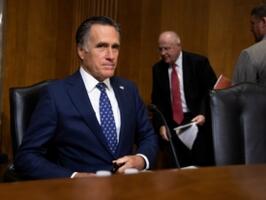An Establishment in Panic By Patrick J. Buchanan
From the day he entered the race, Joe Biden was the great hope of the Democratic establishment to spare them from the horrifying prospect of a 2020 race between The Donald and Bernie Sanders.

From the day he entered the race, Joe Biden was the great hope of the Democratic establishment to spare them from the horrifying prospect of a 2020 race between The Donald and Bernie Sanders.

Voters still aren’t thrilled with the idea of living in a community that protects illegal immigrants from federal authorities. But they support only narrowly a law that would allow victims of crimes by those illegal immigrants to sue sanctuary communities.

The battle is breaking in his favor, even as his own performance has not been that strong.
— There are mixed signals from Bernie Sanders’ narrow victory in New Hampshire, but for now he’s supplanted Joe Biden as a weak frontrunner for the nomination.
— Overall, though, the race remains very uncertain as the scene shifts to the more diverse states of Nevada and South Carolina.
— Center-left candidates got substantially more support than progressive ones in New Hampshire, but the center-left vote split in such a way that Sanders was able to win. Pete Buttigieg has slightly more delegates so far, though.

Several countries including Australia have made voting compulsory, and California is considering a similar law that would penalize those who don’t vote. But voters nationally still don’t like that idea and tend to think worse government would be the end result.

Voters agree the $4 trillion-plus the federal government now spends annually is too much and favor budget cuts, especially in entitlement programs. But most also consider it highly unlikely that spending cuts will occur.

Beware of clickbait character assassins masquerading as "journalists."

President Donald Trump "saved the United States," says former Trump adviser Steve Bannon.

The Rasmussen Reports Immigration Index for the week of February 2-6, 2020 has jumped to 105.8 from 99.7 the week before.

Mitt Romney was the only Republican senator who voted guilty last week on one of the impeachment counts brought against President Trump by House Democrats. Many Republicans were furious at Romney, and a sizable number of GOP voters are ready to throw him out of the party.

President Donald Trump's new budget confirms that without corrective action, trillion-dollar deficits will be with us for years and perhaps decades to come. Trump's budget plan has many smart and urgent spending reforms. But will Congress ignore them once again?

In a way, Donald Trump might be called The Great Uniter.

Forty-two percent (42%) of Likely U.S. Voters think the country is heading in the right direction, according to a new Rasmussen Reports national telephone and online survey for the week ending February 6, 2020.

Impeachment is over and done with as far as most voters are concerned. The House Democrats’ failed effort to remove President Trump has just made him stronger politically, voters say.

"Many Democrats fear that Trump may be laying an impeachment trap," Stephen Collins wrote for CNN last May. "It's possible that the wider political divides get, the more Trump benefits. The spectacle would help him charge up the political base he needs to turn out in droves in 2020 with claims their 2016 votes were being stolen by political elites."

In surveys last week, this is what America told Rasmussen Reports...

Social media is having a greater impact on the nation’s political debate, with nearly half of younger voters now saying it influences their opinions. But with YouTube the latest to announce censorship efforts, voters have little confidence that social media will be able to fairly weed out questionable material.

Are we watching a great political party commit suicide?

By the end of February, the race for the Democratic nomination may have come down to a choice of one of three white men.

When tracking President Trump’s job approval on a daily basis, people sometimes get so caught up in the day-to-day fluctuations that they miss the bigger picture. To look at the longer-term trends, Rasmussen Reports compiles the numbers on a full-month basis, and the results for Trump’s presidency can be seen in the graphics below.

Voters tend to believe President Trump has made America stronger and remain more optimistic about the nation’s future than they have been in years.